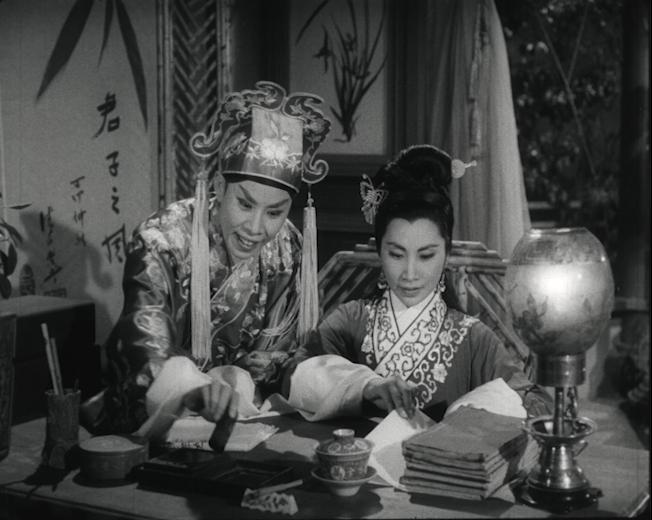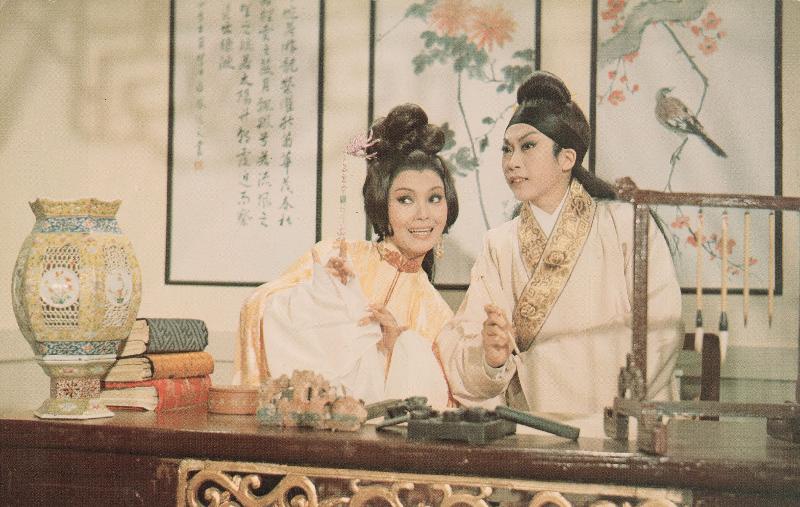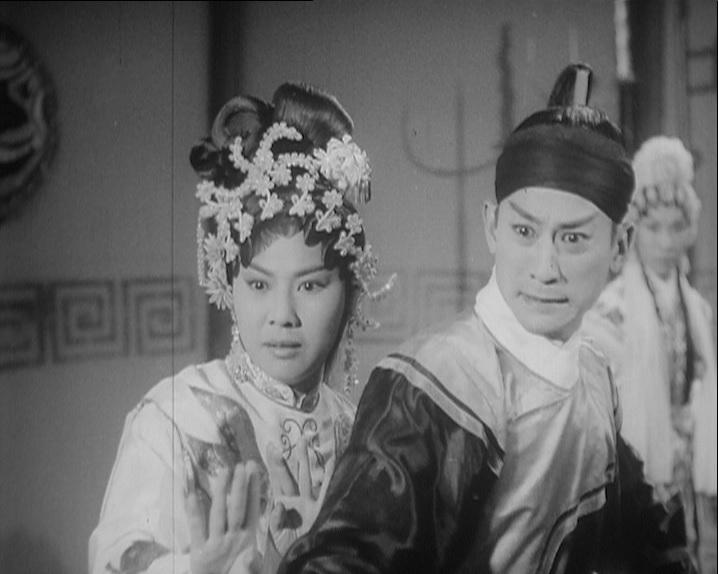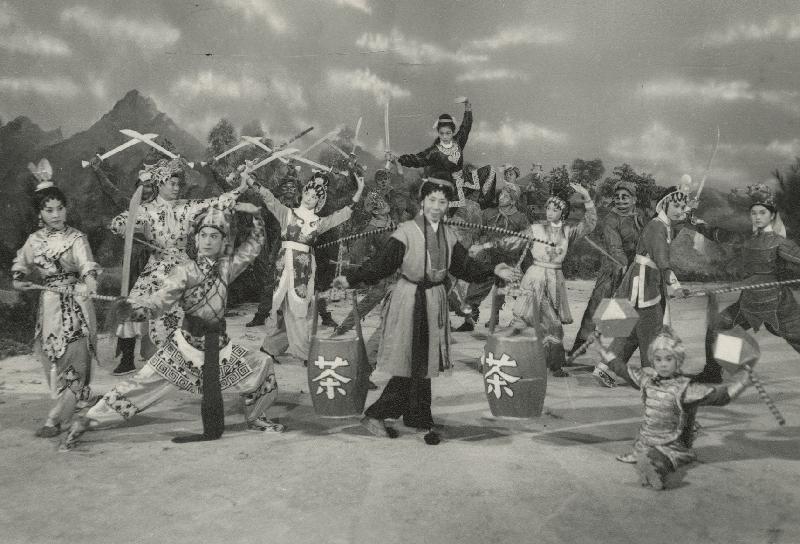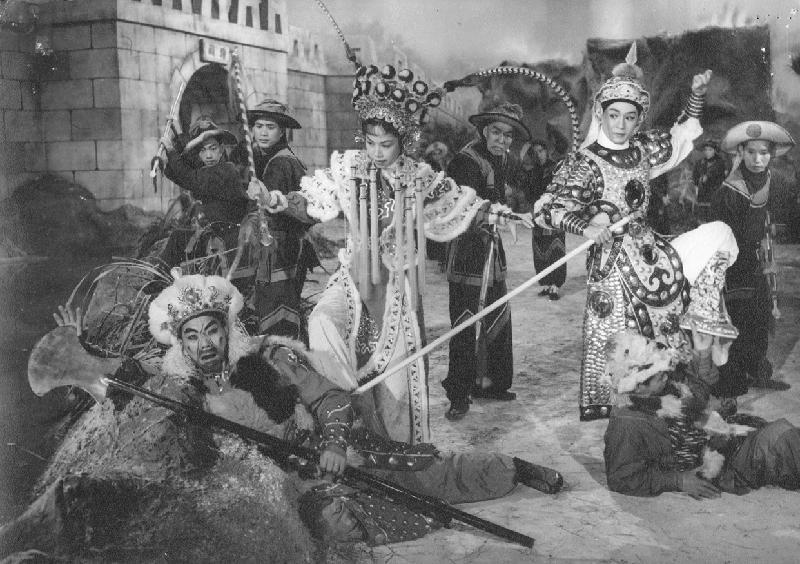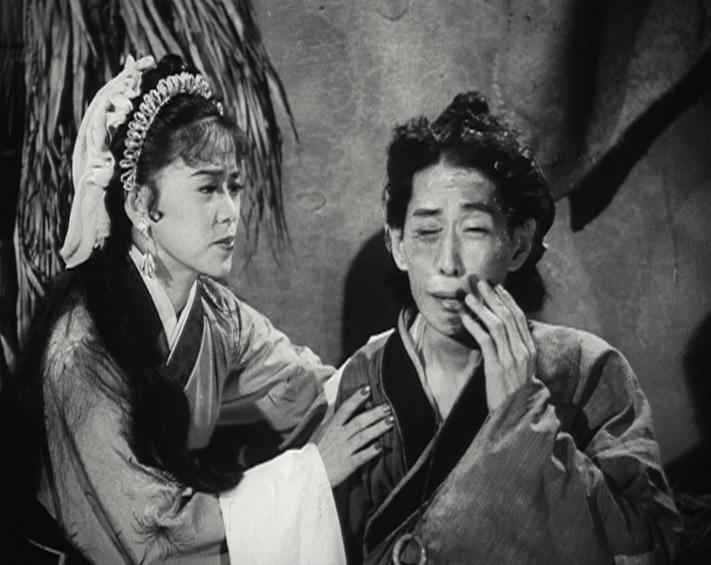Film Archive to present Cantonese opera film classics in reruns at North District Town Hall (with photos)
******************************************************************************************
The HKFA's restored version of "Butterfly and Red Pear Blossom" (1959) centres on a courtesan played by Pak Suet-sin and a scholar played by Yam Kim-fai, who fall in love as they exchange poems. Their romance is thwarted, however. Director Lee Tit's mise-en-scène and Tong Tik-sang's libretto and script as well as the performances of Yam and Pak, Lan Chi Pak and Leung Sing-por have made this a masterpiece of Cantonese opera film.
In "The Legend of Purple Hairpin" (1959) starring Yam Kim-fai and Pak Suet-sin, the directing style of Lee Tit showcased vividly the cinematic structure and rhythm contained in Tong Tik-sang's script as well as the singing, gestures and stylised traditional Cantonese operatic movements of the star-studded opera cast. Over a decade later, Lee made a new version, "The Legend of Purple Hairpin" (1977), featuring Lung Kim Sung and Mui Suet-si. In this film, he often zoomed in on the actors and cut between close-ups of each character. This all-colour version also allowed Lee to further express the characters' emotions.
In "Princess Chang Ping" (1976), starring Lung Kim Sung and Mui Suet-si, John Woo incorporated the act "Negotiating with the Qing Emperor" into his work to make the film closer to the original play than the preceding film adaptation. He also inserted action film elements in the "Princess' Sufferings" act, demonstrating his directorial style.
"The Revenge Battle" (1964) showcases the symbolic gestures of Lan Chi Pak's portrayal of an arch villain. The final scene, in which Lam Kar-sing and Chan Ho-kau are trapped by fire, features a series of specially arranged acrobatic moves such as hair-flinging in unison and round-walking together holding hands.
Renowned Peking opera diva Fen Ju Hua and her disciples give remarkable performances in "The Capture of the Evil Demons" (1962). Playing a tea-selling lady who conquers demons in the final scene, Fen impresses the audience with her legendary water bucket balancing acrobatics - a performance rarely shown on-screen.
"Drums along the Battlefield" (1963) was adapted from the Cantonese opera work in which Lam Kar-sing played his first male leading civil and military role. The same opera cast performed in this cinematic adaptation as well. In the showdown, Lam fully displayed his northern fighting style and dazzling skills, clearly cementing his place as a serious leading man of Cantonese opera.
"The Great Red Robe" (1965) depicts Hai Rui accusing the corrupt Prime Minister Yan Song of 10 major crimes. The scene of Yam Kim-fai and Lan Chi Pak's one-on-one debate, with righteousness contrasting with stateliness, has a clean and fast-paced flow that reaches a heart-pounding climax. Although the existing cut is an incomplete version, it captures the most climactic scenes.
Ho Fei-fan stars as Jia Baoyu in his representative work "The Romantic Monk" (1956), in which he delivers a knockout 12-minute singing performance of "Baoyu Leaves Home for Monkhood" to charm the audience.
Dubbed the "Queen of Huadan (female lead)", Fong Yim-fun played dual roles as twin sisters in "Spring's Joyous Blessings" (1958). She switches perfectly between acting that is physical and dramatic to portray the incompatible personalities of the two characters. Fong further demonstrates her versatility later when she cross-dresses as a brave warrior to save Ho Fei-fan, who plays a general.
"Lust is the Worst Vice" (1963) uses two classic songs of Sun Ma Si-tsang, "Begging for Food" and "Lament of the Jade Sheng", as recurring motifs to convey the film's moral message. Sun Ma's mastery of falsetto singing, his impressive vocal range and the clarity of his notes are unparalleled to this day.
"The Story of Heroine Fan Lei-fa" (1968) was a novelty for audiences at the time for its pairing of the popular huangmei rhythms of the 1960s with Cantonese lyrics. Connie Chan Po-chu not only sings solo in a higher-pitched voice, but even makes a breakthrough by taking up the female warrior role for the first time as the Tang dynasty female general Fan Lei-fa.
All films are in Cantonese. "Butterfly and Red Pear Blossom" and "Princess Chang Ping" are with Chinese and English subtitles; other films only have Chinese lyrics displayed on-screen.
Tickets priced at $30 are now available at URBTIX (www.urbtix.hk). For credit card telephone bookings, please call 2111 5999. For programme details, please call 2739 2139 or visit www.filmarchive.gov.hk/en_US/web/hkfa/programmesandexhibitions/programmes/2020ndth/index.html.
Ends/Wednesday, January 15, 2020
Issued at HKT 18:20
Issued at HKT 18:20
NNNN





